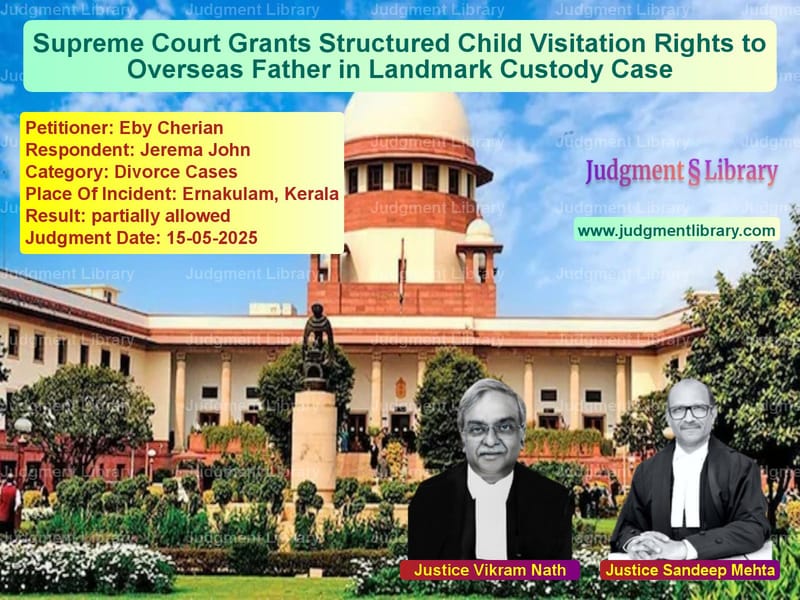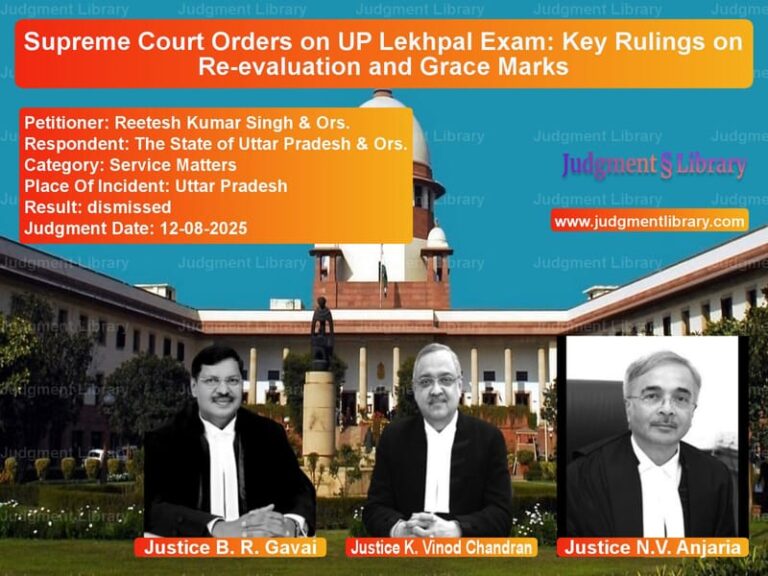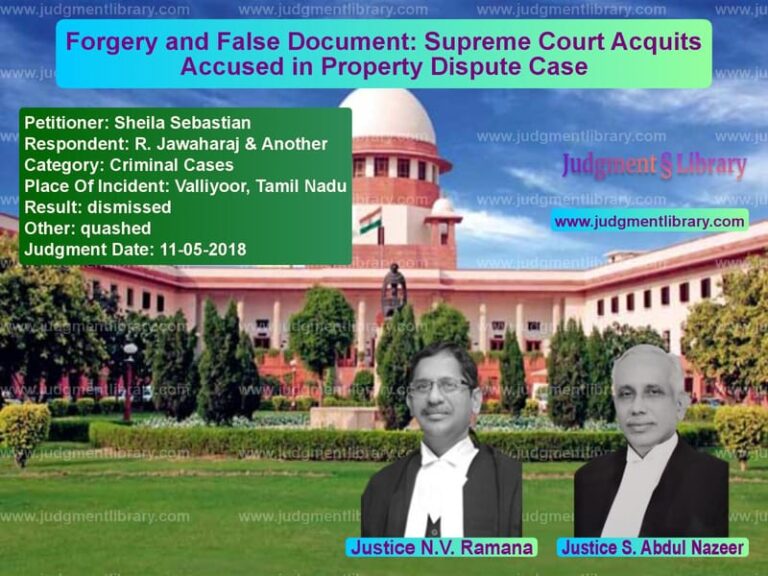Supreme Court Grants Structured Child Visitation Rights to Overseas Father in Landmark Custody Case
In a significant ruling that brings relief to non-resident Indian parents fighting for their child visitation rights, the Supreme Court has delivered a landmark judgment establishing clear guidelines for interim custody arrangements. The case involved an overseas working father’s struggle to maintain meaningful contact with his young daughter amidst protracted custody litigation. The Court’s decision marks a crucial step toward balancing child welfare with parental rights in cross-border family disputes.
The legal battle began when Eby Cherian, a graduate engineer working on rotational overseas assignments, found himself trapped in a procedural nightmare. After his wife Jerema John left their matrimonial home with their daughter Manna Ann Eby in March 2023, Cherian filed for permanent custody while seeking interim visitation rights. What followed was an exhausting cycle of legal applications that saw him file twenty interim applications before the Family Court and four original petitions before the High Court, yet securing only thirty-seven days of physical access over an entire academic year.
The core issue before the Supreme Court was whether the existing system—which required the father to file a fresh application every time he visited India from his overseas posting—served the child’s best interests or created unnecessary barriers to maintaining a healthy parent-child relationship.
The Father’s Legal Struggle
Eby Cherian’s legal team, led by Senior Counsel Ms. Shashi Kiran, presented compelling arguments highlighting the impracticality of the existing system. They emphasized that “the requirement to file a fresh IA on every visit is impracticable, as custody suits in Kerala often last three to four years; the arrangement breeds uncertainty for the child and imposes recurring expense on the appellant.”
The father’s situation was particularly challenging due to his professional commitments. He had initially worked in Angola and later moved to the United Arab Emirates, requiring careful planning of his limited leave days. His counsel argued that “the appellant contends that he resigned his Angola assignment on 24 April 2024 and, having accepted employment in the United Arab Emirates on 6 August 2024, now requires a settled interim timetable to plan leave and international travel.”
Despite consistently paying maintenance of ₹20,000 per month since September 2023, Cherian received no information about his daughter’s schooling or health, significantly impairing his ability to be meaningfully involved in her life. The legal team also pointed to concerning circumstances, stating that “the appellant contends that the respondent’s recurrent seizures and certain health concerns observed in the child while solely in her care reinforce the necessity of predictable periods of custody with him pending final adjudication.”
The Mother’s Position
Jerema John, the respondent mother, presented her perspective through her legal counsel, emphasizing the stability she had provided as the child’s primary caregiver. Her legal team asserted that “from the very outset the marital relationship was strained and that the respondent was subjected to mental and physical harassment by the appellant and his family, which ultimately compelled her to leave the matrimonial home with the child on 4 March 2023.”
The mother’s counsel highlighted her consistent caregiving role, stating that “since that date she has been the sole caregiver, meeting all physical, emotional, educational and medical needs of the daughter, and maintains that the child’s stable routine should not be disrupted by extended or frequent transfers of custody.”
Central to the mother’s argument was the concern about the father’s overseas commitments. Her legal team emphasized that “the respondent emphasises that the appellant works abroad for prolonged periods and, notwithstanding his recent change of employment, remains unable to provide day-to-day care and she contends that the child’s welfare is therefore best served by continuing in her exclusive custody.”
The mother’s legal team also argued for delaying any permanent arrangements until the full custody trial, asserting that “the respondent argues that the custody petition, O.P. No. 1085 of 2023, is pending trial, and argues that any fixed long-term arrangement should emerge only after evidence is recorded and the matter finally decided.”
The Supreme Court’s Analysis
The Supreme Court bench comprising Justices Vikram Nath and Sandeep Mehta delivered a carefully reasoned judgment that prioritized the child’s welfare while acknowledging the practical realities of modern parenting across international borders. The Court made several crucial observations that formed the foundation of their decision.
The Court recognized the procedural burden created by the existing system, stating that “we are persuaded that the arrangement devised by the Family Court, requiring the appellant to file a fresh IA on every visit to India, places an undue procedural burden on both the father and, by necessary implication, the minor child. Custody litigation at Family Court generally proceeds at a measured pace and compelling repetitive applications for what is, in essence, the same relief reduces the child’s time, exhausts the father’s limited leave, and invites avoidable conflict at every turn.”
Significantly, the Court noted the positive relationship between father and daughter, observing that “The Family-Court counsellor and the Judge’s own interaction recorded that the child is at ease with the appellant. No circumstance subsequent to that finding has been shown to diminish the benefit the child derives from the father’s company.”
The judgment emphasized the fundamental importance of maintaining parent-child relationships, stating that “Meaningful contact with both parents is an integral component for the child’s welfare. We believe that where a non-custodial parent demonstrates consistency to be with the child, pays maintenance, and arranges his professional life around the child’s calendar, as the appellant has done in the present case, procedure ought not to stand in the way of a predictable schedule.”
The Court also addressed the practical reality of delayed court proceedings, noting that “The High Court’s reluctance arises mainly from the expectation that O.P. No. 1085 of 2023 would go to trial on 18 September 2024. However, the matter is still pending as on the date of this judgement. In the interregnum, the child cannot be left to the vagaries of piecemeal orders. A structured timetable, sensitive to her routine and the appellant’s overseas posting, is thus imperative.”
The Landmark Directions
The Supreme Court replaced the ad-hoc system with a comprehensive interim arrangement that balances the child’s need for stability with the father’s right to maintain meaningful contact. The detailed directions represent a significant shift toward more structured and predictable custody arrangements in cases involving overseas parents.
For weekend access, the Court directed that “Whenever the appellant is in India for at least 7 consecutive days, he shall be entitled to custody of the child from 10 a.m. on the first Saturday of that stay until 5 p.m. on the following Sunday, and, if his stay exceeds a further week, for the alternate weekend on the same timings. Exchange shall take place at a neutral public spot in Ernakulam to be agreed between the parties or, failing agreement, at the main gate of the Family Court.”
Regarding vacation time, the Court established clear guidelines: “Summer vacations shall be divided into two contiguous segments of equal days each: the first with the respondent; the second with the appellant, provided he is present in India. If the appellant is abroad during the second segment, those days shall lapse without carry-over.”
For festival vacations, the Court created a collaborative framework: “Each festival vacation shall be divided into two contiguous blocks of equal days for the custody. Before 30 days of the holiday dates, the parties shall consult, by e-mail or messaging, and endeavour to agree which parent will take the first block and which will take the second block, keeping the child’s comfort and the appellant’s travel plans in view. If they reach agreement, that arrangement shall prevail and if they do not agree within seven days of initiating consultation, either party may, by a short application, seek the Family Court’s determination of the sequence.”
The Court also addressed travel concerns: “The parent with whom the child is spending a vacation block shall not take her outside Kerala without the written consent of the other parent, communicated by e-mail together with the proposed itinerary at least forty-eight hours in advance.”
Recognizing the importance of maintaining connections during international separation, the Court mandated regular virtual contact: “While the appellant is abroad, the parties shall facilitate video calls on at least 3 weekdays from 8 p.m. to 8.30 p.m. IST, and an additional virtual session on Saturdays from 11 a.m. to 12 noon IST for collaborative activities.”
Most significantly, the Court eliminated the burdensome requirement of repeated applications: “No fresh IAs before the Family Court shall be required for the subsequent visitation periods for the appellant.”
The Court established a streamlined notification system: “The appellant shall e-mail the Family-Court registry and the respondent at least four weeks before his intended arrival in India, specifying the weekends and, if applicable, the vacation block for which he seeks custody. Absence of objection within seven days shall be deemed consent. Any scheduling dispute shall be listed before the Family Court for summary resolution within ten days, confined strictly to logistics.”
Finally, the Court provided flexibility for changing circumstances: “The Family Court may, upon application, vary the logistics (place and timing of exchange) but not the quantum of access, only if materially changed circumstances such as the child’s schooling hours, significant travel distances, or the appellant’s posting, so require.”
Broader Implications
This judgment represents a significant evolution in Indian family law, particularly concerning non-resident Indian parents. The Supreme Court has acknowledged the changing dynamics of modern families where parents often work in different countries while maintaining their commitment to their children.
The Court’s approach demonstrates a sophisticated understanding that child welfare extends beyond physical care to include emotional bonds with both parents. By creating a structured framework that reduces legal conflicts and promotes predictability, the judgment serves the best interests of children caught in custody disputes.
The decision also recognizes the practical realities of international employment and the importance of enabling parents working abroad to maintain meaningful relationships with their children. The streamlined process reduces the financial and emotional burden of repeated litigation, allowing families to focus on building healthy relationships rather than fighting procedural battles.
This landmark ruling sets an important precedent for similar cases involving overseas Indian parents and establishes principles that could influence family courts across the country. By prioritizing the child’s right to maintain relationships with both parents while ensuring stability and routine, the Supreme Court has struck a delicate balance that serves the best interests of children in complex family situations.
The judgment concludes with a directive to the Family Court in Ernakulam to expedite the final disposal of the main custody petition, recognizing that while interim arrangements are necessary, permanent resolutions serve the long-term interests of all parties, especially the child.
Petitioner Name: Eby Cherian.Respondent Name: Jerema John.Judgment By: Justice Vikram Nath, Justice Sandeep Mehta.Place Of Incident: Ernakulam, Kerala.Judgment Date: 15-05-2025.Result: partially allowed.
Don’t miss out on the full details! Download the complete judgment in PDF format below and gain valuable insights instantly!
Download Judgment: eby-cherian-vs-jerema-john-supreme-court-of-india-judgment-dated-15-05-2025.pdf
Directly Download Judgment: Directly download this Judgment
See all petitions in Child Custody
See all petitions in Judgment by Vikram Nath
See all petitions in Judgment by Sandeep Mehta
See all petitions in partially allowed
See all petitions in supreme court of India judgments May 2025
See all petitions in 2025 judgments
See all posts in Divorce Cases Category
See all allowed petitions in Divorce Cases Category
See all Dismissed petitions in Divorce Cases Category
See all partially allowed petitions in Divorce Cases Category







